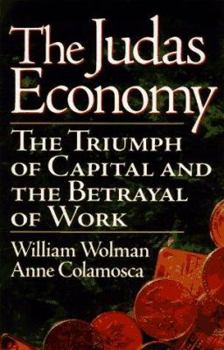The Judas Economy: The Triumph of Capital and the Betrayal of Work
These authors say what business and government leaders are unwilling to admit, but what most workers know instinctively: in the global economy, big money calls the shots and workers are expendable.... This description may be from another edition of this product.
Format:Hardcover
Language:English
ISBN:0201442094
ISBN13:9780201442090
Release Date:June 1997
Publisher:Addison Wesley Publishing Company
Length:240 Pages
Weight:1.60 lbs.
Dimensions:1.0" x 6.4" x 9.5"
Customer Reviews
5 ratings
The study that saw it all first.
Published by Thriftbooks.com User , 19 years ago
How ironic it is to go back to this book written in 1997 and see the entire dynamic of outsourcing and globalization analyzed before it became evident to the rest of us. Even today, however, it is not obsolete because they not only predicted the events but also demonstrated why globalization would have this consequence. They also provide a critical analysis of reengineering which demonstrated the technique as little more that an excuse for downsizing jobs and wages. Even now this book is a must read on globalization.
Excellent. Even More Relevant in 2004
Published by Thriftbooks.com User , 20 years ago
I've read just about everything there is to read in main stream economics. Although I've poured over the works of Hayek, Keynes, Marx, Smith, Ricardo, etc... this book touched me like no other. The plain language of the mechanics of the devaluation of labor was sobering. Althought written in 1997, its message is even more relevant today. People working harder for less, buying into the free market myth, but living the reality. The fact is capital moves much faster than most people can adapt. Forcing people to periodically start over again as jobs are lost. Such negative competition is assisting the small minority of anonymous large investors, but in the process also hollowing out the middle class. Forcing people to work several jobs, or incur debt simply to maintain their economic status. At some point the middle class will reach its limit and its decline will effect both the market and politics. I highly recommend this book. It's insightful, well written, and thought provoking.
A powerful shift
Published by Thriftbooks.com User , 20 years ago
I agree with the main statement of the authors that today those who earn their living from work are coming out losers: shrinking wage growth, problematic pension and healthcare insurance coverage, decline in health and safety protection.Keynes' ultimate nightmare has arrived: industrial capitalism has been replaced by financial capitalism.This is reflected in corporate as well as governmental policies.To hide actual tendencies corporate America has invented newspeak: displacement for firing or re-engineering for big lay-offs.The workers are not only laid off, but even their Social Security System is privatized, offering huge management fees to financial institutions.The policies of the Fed are purely financial, because bankers as creditors don't want te be paid back by inflated notes. It secures also an environment of high real intrest rates. But when the financial sector gets in trouble, it asks the government (all the tax payers) to step in, e.g. the bailout of the savings and loan industry.The authors castigate rightly supply-side economics as a policy of lowering tax rates for the rich and at the same time as a money-raising vehicle for the GOP.They show clearly that small businesses are not the cornerstone of job creation.The position of the US work force is also beleaguered by powerful trends in world capitalism with the rise of India and China and their cheap labour force.The authors prescribe sensible measures to reverse the trend: public investment (infrastructure), improved education and research and development.But I don't believe that these measures can stop the immensely powerful shift that is taken place from the US/European markets to Asia. Ultimately, the economic world centre will be replaced by a new one, probably China.A very revealing and necessary book. Not to be missed.
Very involving and with sound logic to support conclusions
Published by Thriftbooks.com User , 25 years ago
This book takes economics out of abstract textbook equations and applies it to government, culture,etc.The book makes good use of statistics,for things like concentration of wealth among different income levels and the average wage increases through the years of all kinds of education levels.It is explained why cultural differences can make one country more competitive in one area than another, and other ways in which culture impacts economics and vice versa.For example, Indians are credited with drawing corporations with their close family ties:there's usually someone to watch over the kids while Mommy or Daddy takes another shift, and there's no day-care expenses or parents taking time off to be with a sick child. Finally,it's not too technical and it's a whole lot more interesting than some economic material I've digested.
In the late 20th century, big money holds all the cards.
Published by Thriftbooks.com User , 25 years ago
A great primer on the post-coldwar economy where the balance of power has shifted dramatically in favor of capital over labor. Wolman and Colamosca contend that the mobility of capital (in contrast to labor), has lead to a shifting of the balance of power between capital and labor. The "average worker", including many of our best and brightest, will continue to see their plight worsen as the nation as a whole prospers. A very readable if not distressing account of the consequences of our world view where the market-gods reign supreme.





